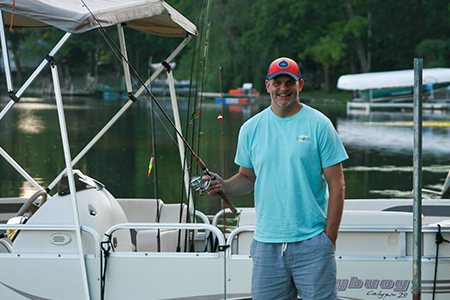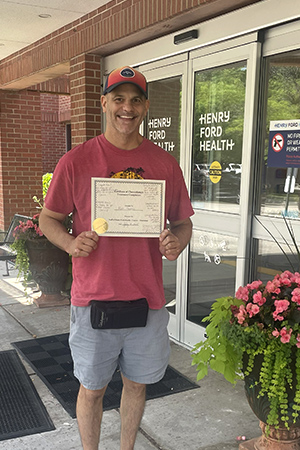Ron’s Rectal Cancer Story
 Diagnosed After First Colonoscopy, Trenton Resident Inspires Others to Get Screened
Diagnosed After First Colonoscopy, Trenton Resident Inspires Others to Get Screened
With a fulfilling career as a power plant operator for DTE Energy, a wife of 25 years, and two healthy kids, Ron Snoes of Trenton says he has much to be thankful for. The active 47-year-old enjoys golfing, working out, and restoring old Jeeps — a lifestyle that gave him every reason to believe he was in good health.
Rectal bleeding provides a clue something wasn’t right
In 2023, Ron began noticing occasional rectal bleeding. Concerned but not alarmed, he sought medical advice.
“I went to a couple of doctors who were not really concerned given my active lifestyle and suggested it may be due to hemorrhoids,” he recalls.
When the mild bleeding persisted, Ron decided it was time to take the next step. In March 2025, he scheduled his first colonoscopy — a decision that would change his life.
“The colonoscopy revealed a large cancerous polyp in my rectum. I was shocked and devastated when I received the news because it was not what I expected to hear,” he says.
Finding the right team after a life-changing diagnosis
As the reality of the diagnosis set in, Ron focused on finding the best possible care. He met with physicians at two major health systems known for cancer treatment — including Henry Ford Health.
“When my wife and I met with Dr. Ira Wollner and Dr. Craig Reickert with the Henry Ford Cancer team we just knew the minute we talked to both of these doctors that this was the right place for me,” says Ron. “They gave me a sense of confidence, made me feel calm about everything, and were confident and positive about being able to help get me to a cure.”
A targeted treatment plan begins with chemotherapy
 Dr. Wollner says Henry Ford Health’s nationally accredited rectal cancer specific multidisciplinary tumor board used imaging, including pelvic magnetic resonance imaging (MRI) specifically tailored for staging rectal cancer and endoscopy findings to determine the stage of Ron’s cancer. “We applied national guidelines kept up to date with recent progress from clinical trials to determine that we could achieve the desired results for Ron with just four months of intravenous chemotherapy followed by surgery, sparing him the side effects of radiation therapy and the additional treatment time it would impose,” he says. “After the chemotherapy treatment was completed, his imaging and endoscopy were repeated to determine how effective it had been, permitting Dr. Reickert to decide the nature of the surgery he would perform.”
Dr. Wollner says Henry Ford Health’s nationally accredited rectal cancer specific multidisciplinary tumor board used imaging, including pelvic magnetic resonance imaging (MRI) specifically tailored for staging rectal cancer and endoscopy findings to determine the stage of Ron’s cancer. “We applied national guidelines kept up to date with recent progress from clinical trials to determine that we could achieve the desired results for Ron with just four months of intravenous chemotherapy followed by surgery, sparing him the side effects of radiation therapy and the additional treatment time it would impose,” he says. “After the chemotherapy treatment was completed, his imaging and endoscopy were repeated to determine how effective it had been, permitting Dr. Reickert to decide the nature of the surgery he would perform.”
Successful surgery and a strong recovery
With the chemotherapy complete and the tumor significantly reduced, Ron underwent a Low Anterior Resection (LAR) — a surgical procedure that removes the affected portion of the rectum and reconnects the healthy section to the colon.
Dr. Reickert explains that Ron required two procedures: the initial surgery with a temporary ileostomy to allow healing, followed later by a reversal surgery to restore normal bowel function. The surgery to reconnect the colon near the sphincter muscle in the rectum needs time to heal fully before stool can pass through the area safely. The ileostomy diverts the flow and still allows the patient to eat and drink normally, and allows patients to be out of the hospital while continuing to recuperate from the surgery. “After checking the area for healing, the ileostomy was reversed with the second surgery and Mr. Snoes is adapting well,” says Dr. Reickert. “His physical exams, scans and blood tests all show great results with no evidence of cancer at this point and is ready to resume all normal activities. Our cancer team, including Dr. Wollner, will continue to follow up with scans and colonoscopy tests over time.”
Looking ahead with gratitude and hope
 With the encouraging news that there is no evidence of cancer, Ron is focusing on returning to work at DTE Energy by the end of the year and getting back to the activities he loves.
With the encouraging news that there is no evidence of cancer, Ron is focusing on returning to work at DTE Energy by the end of the year and getting back to the activities he loves.
“I have much to be thankful for, including the doctors who provided exceptional care and treated me like family,” he says. “Dr. Reickert made it a point to see me several times in the hospital after my surgery, including relaying the good news about my pathology report, which showed I was cancer free. As a patient, that was priceless to me and showed me how much he cared.”
A new mission: Encouraging others to get screened
The cancer journey was not one Ron ever expected, but it’s given him a new purpose.
“I’ve made it a priority to raise awareness of colorectal screening to help save lives,” he says. “I considered myself to be very healthy and should have gotten my colonoscopy at age 45. I shouldn’t have ignored my symptoms.”
Through sharing his story — both in his community and on social media — Ron has already inspired friends and coworkers to schedule their own screenings.
“In my case, thanks to the colonoscopy and the treatment at Henry Ford, my life has been saved,” he reflects. “It means the world to me to spread this message and hopefully help others do the same.”
For more information, visit Colon and Rectal Cancer Treatment at Henry Ford Health.
.svg?iar=0&hash=F6049510E33E4E6D8196C26CCC0A64A4)

/hfh-logo-main--white.svg?iar=0&hash=ED491CBFADFB7670FAE94559C98D7798)